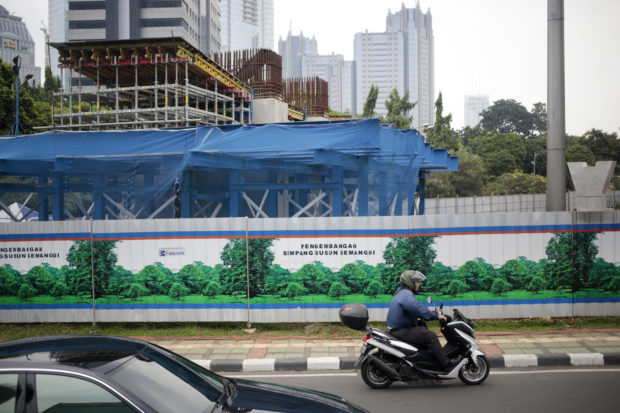Jakarta fake nature thrives as Indonesia cuts its forests

In this Thursday, Nov. 10, 2016 photo, a motorist rides past a construction site covered with metal sheets decorated with large stickers depicting greenery at the main business district in Jakarta, Indonesia. One of the strange sights in Indonesia, an ecologically rich archipelago of more than 13,000 islands, is its capital’s fondness for fake greenery at a time when the country is known for cutting down its precious tropical forests at a record rate. AP
JAKARTA, Indonesia — Indonesia’s capital is lush with fake greenery even as the country is cutting down its precious tropical forests at a record rate.
Jakarta’s gleaming air-conditioned malls have a particular fondness for lifeless extravaganzas of plastic ferns or autumnal trees that don’t drop any leaves.
Construction sites are wrapped in screens printed with giant leaves glistening with dew drops or the picturesque deciduous forests found in temperate climates. A new terminal at the international airport has a mini-jungle within its cavernous air-conditioned interior. Despite the odd inclusion of fake grass it has the slight saving grace that the potted greenery is real.
It’s not that Jakarta lacks real trees. The presidential palace has well-manicured surrounds of park, verges and trees. But elsewhere, against the backdrop of unrelenting traffic and brutalist concrete, the greens often seem weirdly out of place, like an introduced alien species.
“Shuttling between air-conditioned high rises decorated with a simulacrum of nature, it’s easy to ignore the impact on climate and communities of relentless forest destruction taking place far away,” said Greenpeace Indonesia campaigner Yuyun Indradi.

In this Friday, April 28, 2017 photo, workers take a break at an artificial garden at the newly-opened Terminal 3 at Soekarno-Hatta International Airport in Tangerang, Indonesia. The urban embellishments creates an irony as environmental destruction takes place elsewhere in the nation. Record forest fires in Sumatra and Kalimantan in 2015, often set to clear land for plantations, hastened tens of thousands of deaths from air pollution, according to a Harvard and Columbia study, and by World Bank estimates cost $16 billion. AP
Indonesia’s most densely populated island, Java, is nearly completed denuded of its original virgin forest and Sumatra is nearly as bare. Palm oil and pulp wood plantation companies are now making inroads into the great forests of Borneo and Papua.
The draining of tropical wetlands for industrial plantations has also come at a significant human cost. Record dry season fires in Sumatra and Borneo in 2015 hastened 100,000 deaths in the region from air pollution, according to a Harvard and Columbia study, and by World Bank estimates cost Indonesia’s economy $16 billion.
“Perhaps when our children grow up, fake trees may help them reflect on how badly we need to protect that which is authentic and can’t simply be purchased in a mall,” said Indradi. “Or will they decide that the more comfortable, accessible and colorful fake version will do them just as well?” CBB